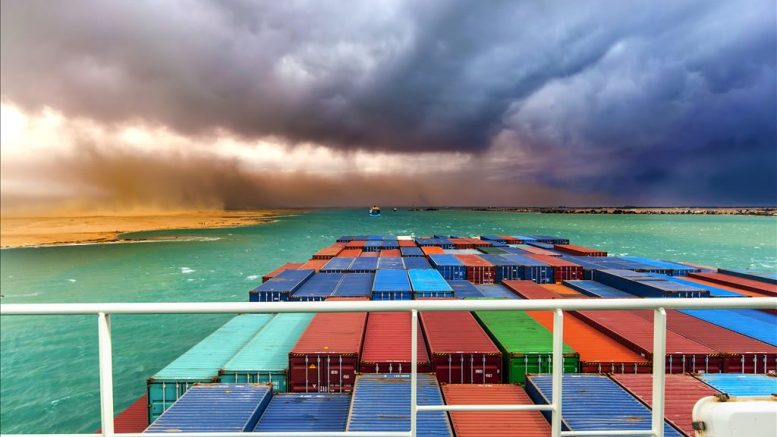It is alone in a world in which the rules-based global order of the last half-century is set to be replaced by dog-eat-dog, survival of the fittest, beggar-thy-neighbour trade policy chaos, writes Geoff Kitney.
A shiver must surely have just run down the spines of British officials preparing to do battle to ensure that the United Kingdom achieves its declared post-Brexit status as a global trading power.
Because recent developments suggest that what they are facing is a 21st century economic version of the Battle of Britain. At stake may well be the future prosperity of the nation.
What is now clear is that the starry-eyed optimism of the Brexit cheer-squad about post-Brexit Britain being free to negotiate gold-star, bespoke free-trade agreements with global partners which share their vision of an ever-wider opening of borders was not just dangerous, but quite possibly disastrously misplaced.
What now appears to be in prospect is a post-Brexit Britain alone in a world in which the rules-based global order of the last half-century will be replaced by dog-eat-dog, survival of the fittest, beggar-thy-neighbour trade policy chaos.
EU27 wants UK as close friend & partner and will enter talks on future with open, positive mind. But given UK red lines only an FTA is possible. It will be the first FTA in history to loosen, not strengthen economic ties. Drifting apart is essence of #Brexit.
— Donald Tusk (@eucopresident) 7 March 2018
If such a nightmare eventuates, the safest place for Britain to be would be inside the European Union (EU) and empowered by the collective global trading muscle of the European Customs Union and the single market.
Even if it doesn’t come to the nightmare scenario, the events of the past few weeks confirm what trade policy realists have been saying about the risks for Britain as a nation going it alone on trade in a world in which protectionist forces have been steadily gaining strength and showing an increasing willingness to use their muscle.
The announcement by President Donald Trump of his intention to impose tariffs on steel and aluminium products to protect American industries – and his declaration that he would welcome a trade war which would “be easy for us to win” – is reverberating around the world with menacing urgency.
The EU’s blunt retort that it would have little choice but to respond with calculatedly brutal counter-action sets the scene for what could easily slide into a pre-World War Two protectionist surge which would disrupt the global economy and potentially lead to recession and even ultimately to conflict.
Short of that, however, there are other scenarios for the global economy which would still risk potentially dire consequences for the UK.
Trade negotiators never make concessions that aren’t in their own interests. Trade negotiations are inevitably battles in which self-interest is always the driving force
The dream of Britain as a global trading power was created with the assumption of a much more benign reality in the global trading system.
Its starting point was for a continuation of support by the world’s major power for an open global trading system in which nations would enter free-trade negotiations with an overriding assumption that trade deals would work best when they serve the mutual self-interest of the negotiating partners.
There was even a view among the Brexiteers that an independent Britain would find traditional partners – especially the so-called “Anglosphere” nations – prepared to offer a bit of “affirmative action” to their British negotiating partners, a helping hand to make sure that Britain achieved its post-Brexit trade ambitions.
That idea was always absurdly removed from reality. Trade negotiators never make concessions that aren’t in their own interests. Trade negotiations are inevitably battles in which self-interest is always the driving force.
Two real-world events reinforce this point.
Even when a long, deep bilateral relationship is involved and a loyal ally, which has sent its sons to fight and die alongside their American “mates” in every conflict for more than a century, no favours can be expected
One is the apparent shock that British negotiators felt when they sat down in January to commence negotiations with their US counterparts to discuss post-Brexit aviation rules for access to each other’s skies.
What the US put on the table was a deal said to be “significantly worse” than that which the US and EU have in place. The US offered only a standard bilateral agreement without any of the concessions made to European airlines which were achieved through the combined negotiating power of the European Union nations.
Analysts said that what this showed was that the idea that it would be possible to simply replace the EU’s name in trade agreements with the UK was simply not going to happen.
Every trade agreement to which the UK is a party as a member of the EU would have to be renegotiated, with the UK unable to bring the muscle to these negotiations that it had as an EU member.
A second reality check comes from the other side of the world – but with a clear message for the UK.
In late February the Australian Prime Minister, Malcolm Turnbull, visited Washington for his first official bilateral consultations with President Trump. The theme of the visit was “one hundred years of mateship”, reflecting the history of the close relationship between the US and Australia which has seen Australia commit troops to every war in which the US has engaged since Australia became a sovereign nation at the turn of the 20th century.
At that meeting, the issue of US tariffs on Australian steel and aluminium products was not raised. Trump gave no hint of the announcement he intended to make and Turnbull had no reason to raise the issue because Australia had previously received an undertaking from US officials that Australian steel and aluminium producers would continue to be imported into the US under existing, long-standing, low tariff rates.
Literally hours after Turnbull set foot back on Australian soil, the Trump tariff announcement was made. Initially Australian officials suggested that Australia would be exempt from the effect of steel and aluminium tariff increases.
The next day the stern word came from Washington: no exemptions will be allowed.
A humiliated Turnbull retorted with a stern warning to Washington that such protectionism would pose a grave threat to the health of the global economy. Behind the scenes Australian officials were working frantically to try to overturn the “no exemptions” edict.
With “mateship” apparently not striking a chord with Trump, Australia tried a different tack.
Turnbull has put a case to the White House that national security considerations – that is, the important strategic role Australia plays as a US ally in south-east Asia as host to important US intelligence gathering bases and to US forces operating in the region – should qualify Australia for exemption from Trump’s proposed tariffs. This followed indications that Trump might be prepared to offer “carve outs” from the tariffs for Canada and Mexico based on national security considerations.
The Guardian on Saturday reported a win for Mr Turnbull, saying the Prime Minister had confirmed that Australia had won a reprieve from the United States’ global steel and aluminium tariffs, after the US president earlier tweeted that he and Mr Turnbull were working on a “security agreement” for an exemption.
Mr Turnbull said an executive order would be signed by Mr Trump exempting Australia from the tariffs. Mr Turnbull said legal paperwork confirming the exemption was yet to be completed, but an executive order would put Mr Trump’s direction in place. Australia would not have to provide anything in return for the exemption, Mr Turnbull added.
In Australia, Mr Turnbull is now being criticised for doing a “dirty side deal” instead of joining other major powers in taking a principled stand against Mr Trump’s protectionism.
Every trade agreement to which the UK is a party as a member of the EU would have to be renegotiated, with the UK unable to bring the muscle to these negotiations that it had as an EU member
The key lesson about this for the UK is that, even when a long, deep bilateral relationship is involved and a loyal ally, which has sent its sons to fight and die alongside their American “mates” in every conflict for more than a century, no favours can be expected.
Where trade is involved, in the Trump era, brutal self-interest prevails.
If ever there was a time when Brexit might have been a good idea – and this is highly arguable – that time does not appear to be just as protectionism regains a grip on the global trading system.





